South Korean President Yoon Suk-yeol just completed a six-day visit to the United States commemorating the 70th anniversary of the U.S.-South Korea alliance. This week’s summit marked the fifth meeting (and second summit) between U.S. President Joseph Biden and Yoon in less than a year, and it is only the second state visit hosted by Biden.
Yoon’s travel to Washington also included a speech delivered during a joint session of Congress, a visit to NASA’s Goddard Space Center, a forum with U.S. and South Korean businesses hosted by the U.S. Chamber of Commerce, and a White House state dinner where Yoon crooned a few lines of Don McLean’s 1971 hit, “American Pie.”
Washington rolled out the red carpet for Yoon to highlight the strength of military, economic, and people-to-people ties between the United States and South Korea. The fanfare also reflected the Yoon government’s increasing role and contribution in sustaining a rules-based order in the Indo-Pacific with like-minded partners. Additionally, Congress’s invitation to Yoon was in part an acknowledgment of the more than $100 billion in South Korean investments directed toward the United States since Biden first took office.
The state visit comes at a time when support for U.S.-South Korea relations remains high in both countries. However, Yoon faces growing domestic criticism over recent foreign policy statements and actions related to revelations of U.S. spying on the South Korean president’s office, the recent South Korea-Japan rapprochement, and South Korean military assistance for Ukraine.
The second Biden-Yoon summit covered a wide range of issues and will have a long-term positive impact in reinforcing the ironclad nature of the bilateral alliance. In the near term, however, Yoon may hope that his presence at the highest level of diplomacy can staunch, if not reverse, his sagging domestic approval ratings.
Ensuring extended deterrence amid North Korean aggression
One result of the summit, touted by both the Biden and Yoon governments, was greater U.S. commitment and reassurance to boost extended deterrence against Pyongyang. Framed under the new Washington Declaration, the two leaders unveiled a series of measures to reaffirm U.S. commitments to strengthen extended deterrence against North Korean provocations.
More specifically, the two sides initiated a Nuclear Consultative Group (NCG) to address nuclear contingencies and provide greater transparency on plans to counter North Korea’s growing threat. Most notably, the United States pledged to give South Korea a central role in the strategic planning of a nuclear response strategy during a potential conflict with North Korea, as well as regular consultations and improved information sharing, in exchange for a commitment from Seoul to not pursue its own nuclear weapons program. The declaration also includes plans to dock U.S. nuclear-armed submarines in South Korea for the first time in over 40 years, visibly showcasing U.S. strategic assets in the region.
Securing democracy in a rules-based international order
Freedom, democracy, human rights, and support for a rules-based international order were central themes throughout the visit. When addressing Congress, Yoon repeatedly invoked memories of the Korean War and South Korea’s subsequent meteoric economic development to emphasize that the U.S.-South Korea alliance is well-positioned to be a linchpin in safeguarding global democracy and prosperity.
Against the backdrop of Russia’s war in Ukraine, South Korea has emerged as a major arms exporter. Biden and NATO have continued to press Yoon to provide direct military support Ukraine beyond humanitarian and economic aid. However, South Korea’s Foreign Trade Act, which bans the sale of lethal weapons to countries at war, and its fears of antagonizing Russia given Moscow’s influence over North Korea, have contributed to Seoul’s hesitancy to arm Ukraine directly. Before the visit, Yoon signaled willingness to potentially send weapons to Ukraine. This may satisfy U.S. requests for more support in the short term.
On the Indo-Pacific, Biden and Yoon emphasized alignment in their Indo-Pacific strategies to address global challenges and preserve regional stability. It was notable that both leaders reaffirmed their commitments to preserve peace across the Taiwan Strait and freedom of navigation in the South China Sea. Yoon and Biden emphasized a new chapter in the alliance that involves both allies taking a leadership role in addressing timely global issues, including climate change, economic development, energy, and food security.
Coordinating on emerging technologies and economic security
In both the joint statement, and during Yoon’s congressional address, the two governments proclaimed an “alliance in action towards the future.” Expanding beyond traditional defense issues, the future of the alliance – one powered by batteries, semiconductors, and emerging technology – was on full display. During Yoon’s three full days in Washington, significant discussion revolved around themes of economic security, science and technology, space, cybersecurity, and climate change. Two key deliverables in this area included the establishment of an annual bilateral dialogue on next generation critical and emerging technologies, and a bilateral Strategic Cybersecurity Cooperation Framework.
On economic security, the two leaders briefly acknowledged in their joint statement recent efforts to address South Korean concerns about the implementation of the U.S. Inflation Reduction Act (IRA) and the CHIPS and Science Act, as well as the provisions related to tax subsidies for electric vehicles, and restrictions on advanced semiconductors sold or manufactured in China. Although no concrete steps were announced publicly, the two presidents pledged to continue close consultations to ensure that both acts encouraged “mutually beneficial corporate investment in the United States by creating predictable conditions for business activities.”
At the non-governmental level, a delegation of 122 business leaders, including the heads, of South Korea’s largest companies, accompanied Yoon to Washington. The U.S. Chamber of Commerce’s U.S.-Korea Business Council hosted Yoon along with U.S. Secretary of Commerce Gina Raimondo to discuss collaboration on economic security, critical and emerging technologies, and digital transformation, among other topics.
Several new business deals were also signed, including a $2.5 billion deal from Netflix to produce additional Korean dramas, movies, and reality shows for the next four years reflecting growing demand for Korean content.
Domestic messaging and constraints
The Yoon government hopes that images of a beaming Biden during Yoon’s rendition of “American Pie,” and a lengthy standing ovation and bipartisan applause in Congress will help boost flagging domestic support at home. Yoon has already received some flak from South Korean media, including an editorial in the conservative Chosun Ilbo, criticizing the Washington Declaration and new defense commitments as insufficient to protect the country from North Korea’s growing nuclear threat, and for keeping South Korea “shackled” to the United States. Although the deal was designed to clarify U.S. commitments, the Yoon government may need to further sell the declaration to an increasingly vocal South Korean public clamoring for their own nuclear weapons.
Yoon’s summit with Biden will be followed by his attendance at the G-7 summit in Japan and likely the NATO summit in Lithuania which may further boost South Korea’s global reputation. It remains to be seen whether Yoon’s performance on the highest international stages will strengthen his position at home, enabling him to follow through on some of his ambitious foreign agenda aimed at strengthening global democracy and a rules-based international order.
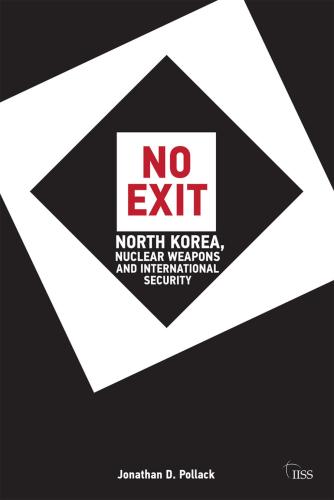
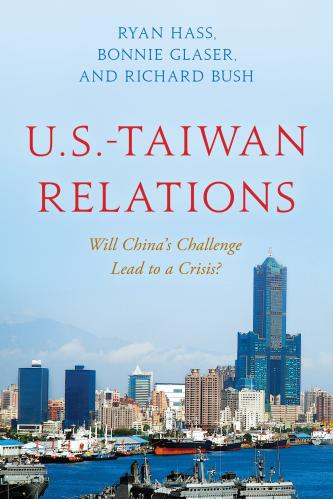
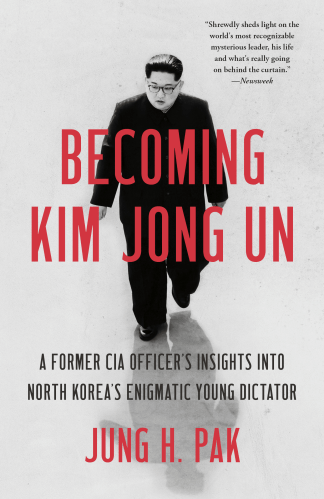
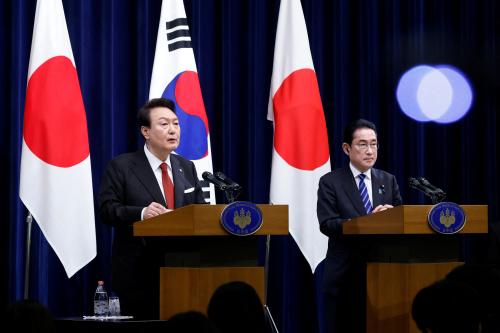
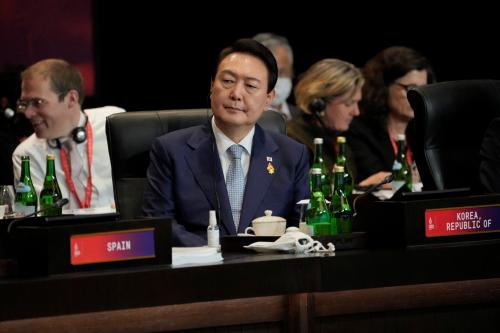
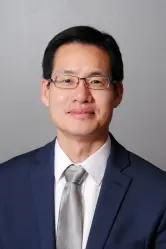


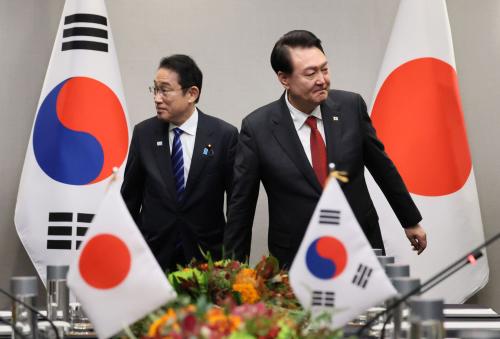
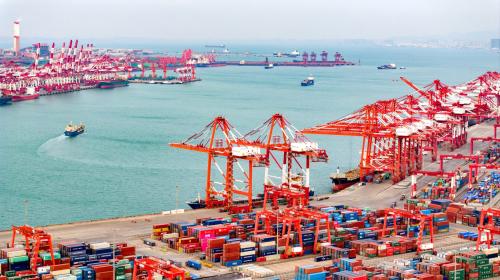
Commentary
South Korean-American pie: Unpacking the US-South Korea summit
April 28, 2023